"It's Awkward Right Now:" What Some in the Games Industry Think of the Rise of the Loot Box in 2017
2017 was the year we opened Pandora's loot box. Here's what some in the games industry are thinking.
This article first appeared on USgamer, a partner publication of VG247. Some content, such as this article, has been migrated to VG247 for posterity after USgamer's closure - but it has not been edited or further vetted by the VG247 team.
Close your eyes. Imagine that it's the 1990s again. You're a kid (or an adult, whatever). Pokemon Trading Cards are the new hotness. You can buy them and trade them individually, sure, but the core of the experience comes in those enticing blind card packs. You have one in your grasp. What will you get inside? You linger on tearing open the foil as you hope for the best. Then it's a bunch of commons like energy cards. So it goes, and the process repeats.
Now open your eyes. It's 2017. You're playing a triple-A shooter—Call of Duty: WWII to be exact. You're in a grand social hub, not too different from trading cards in a local park. But you've seen this place before too. It's Normandy, the only locale of World War II that video games ever seem to remember. Only now it's crawling with others like you: emoting, testing out guns in the makeshift shooting range. Then a "supply crate" drops from the sky with dramatic flair. It's a loot box, virtual cards float in the air, erected from it with a glow. You remember, just for a moment, the feeling of opening foil trading card packs and being disappointed. You realize that feeling never dissipated. It's right here on the beaches of Normandy.
It's also in the intergalactic battles of Star Wars Battlefront 2. It's in the endgame grind of building Orc armies in Middle-earth: Shadow of War. It's sandwiched between the races of Forza Motorsport 7. It's buried in the menus of Assassin's Creed: Origins. It's in the Battle Royale-themed crates from a limited time event for the Early Access game PlayerUnknown's Battlegrounds. Loot boxes, frankly, are everywhere. And players sure hate it.
But beneath all the anger is an uncomfortable reality. Technology is developing faster than it ever has before in the past, thus making it increasingly more expensive to make games. With the fast-moving market, prices of games and consoles has stayed mostly stagnant. An anonymous studio director told GamesIndustry.biz that even with costs to make games ballooning, prices haven't risen with it. "Development costs of AAA titles are five to ten times the price they were in the '90s," the source told the site. "As technology moves forward, costs go up and teams get larger. Salaries also go up in that time both for starters and people employed for those periods of time. But sales and prices have remained pretty static—especially given the 'sale culture' nowadays."
Given the fact that triple-A publishers are relatively cagey about budget costs and the like, players have hardly an inclination to the real life cost of video games, only vague guesstimates. We only see the results when they don't do well: mass layoffs, or worse, studio closures.
Meanwhile, usually the publisher and top executives stays in business, and the developers are left to bear the consequences. Games are expensive, and in theory, microtransactions are the industry's way of trying to sustain themselves in the long term. Beyond the $60 base price that dips in the months after release. (Just look at this week's Black Friday deals, for instance, where games released just weeks ago are already 50 percent off.)
Before this year, microtransactions weren't really aimed at the average player, but what might be dubbed the "premium gamer." The ones with money to burn. The ones that throw hundreds of dollars at FIFA's Ultimate Team mode to feel powerful. The ones who own the "premium" console the Xbox One X for their 4K television that most people can't afford. They're who Phil Spencer of Microsoft might call a "discerning connoisseur of gaming." They're a minority, still. And while people complain, they still spend money. A lot of money, in fact. EA's Ultimate Team alone accrues $800 million a year. As the world says, money talks. And those figures speak volumes.
But the problem, seemingly, is that microtransactions aren't just an optional luxury for the player with a fat wallet anymore. They're starting to hinder the experience for the average person who plays games too. The ones without money to burn. And 2017 is the year of the reckoning.
"It's Awkward Right Now"
So it's a weird time right now in big budget video games as they try to find their footing, or rather, find the best route for monetization. The controversy of microtransactions this year has recently overshadowed the games they're in themselves, most notably stirring the pot in Star Wars Battlefront 2 and Middle-earth: Shadow of War. So yeah, things are awkward in the games industry. At least, that's what Jeremy Stein, Director of Product Management for the mobile game company Jam City tells me.
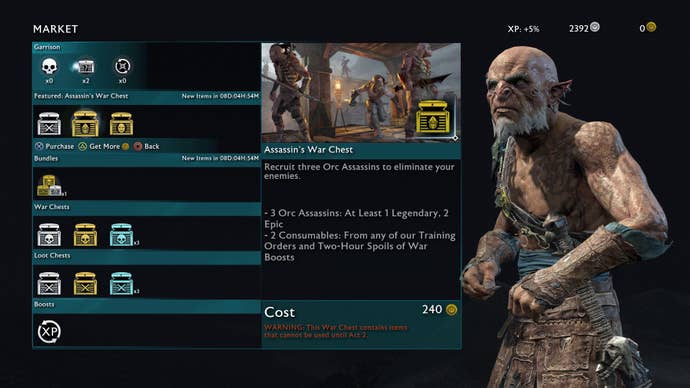
Stein, a former developer on the Madden series (though long before microtransactions were as prevalent as today), has seen microtransactions from both ends of game development: triple-A and free-to-play. He understands better than most the high cost of development. But he's noticed one clear thing in console games of late: they're missing the point of making games fun for the players who don't buy anything.
Stein breaks down the difference for me. Free-to-play games, being quite literally free to download and play, monetize everything. They monetize power. They monetize stamina, or the amount you can play in a single sitting. They monetize aesthetic too, like cosmetic items. Everything is up for monetization. This is how free-to-play games operate and make their money. But the key to those games isn't in arbitrarily locking things behind paywalls, it's in making the game enjoyable for people who never spend a single penny too. The best sorts of free-to-play games incentivize you to spend money on it because you're actively enjoying your time with it.
"I think the smartest games are doing a really good job of making a great experience for someone who never spends money," says Stein. "In my game [Panda Pop], my mother-in-law is about level 825. She plays it all the time. She's never monetized. She's never spent a dime in my game, despite spending thousands of hours using our servers. And that's great. I want her to be, you know, part of the majority of players that keeps playing my game, and if I make choices or the people who work for me make choices that makes the game worse for her [because she doesn't] spend money, then I have screwed up. Because that's where [microtransactions] come into the game design part of it."
Like free-to-play games on mobile, triple-A sports games on consoles are no stranger to tedious microtransactions either. Modes like Ultimate Team across Madden, NHL, FIFA, and NBA Live gently prod the player to spend money on top of the game, to automatically craft their dream team of sports stars immediately in lieu of hours of grinding. This has been the norm for years now, but in Star Wars Battlefront 2 and Middle-earth: Shadow of War, the same principle is being embedded. For the general player who doesn't touch sports games, it's easy to see why it's such a shock. (Even if on the evening of November 16th, EA temporarily pulled microtransactions after backlash from Battlefront 2, noting that it will eventually return at some capacity. Even then, the grind exists solely via loot boxes, which is a problem on its own.)
When I reached out to a slew of studios to chat about microtransactions in 2017, Ubisoft was the only major developer open to the conversation, perhaps due to the laidback nature of their latest game Assassin's Creed: Origins' approach to microtransactions compared to other studios. Namely, the fact that microtransactions are hardly in player's face at all.
"For Assassin’s Creed: Origins, our philosophy as a whole is to respect our players and to make sure these transactions are entirely optional," live content director Bruno Guérin for Assassin’s Creed: Origins told me over email. "Our rule of thumb is that everything you can acquire from our store with Helix Credits is also attainable simply by playing. Every single quest or activity remains valid, meaningful and rewarding no matter how much money you invest in the game." Guérin noted that while there's still "time savers" for busier players to purchase if they don't want to do side quests, as well as sillier cosmetics (like a Unicorn mount), they remain optional and buried in the game's menus.
Pay-For-Fun
Long ago, video games inherently over-monetized enjoyment. Not in microtransactions, but in just as high of a cost. Adjusting to inflation, the Neo Geo would cost upwards of $1,000 today; the NES $441; the Sega Saturn $640. The only people that could play video games back in the day were people that already had money. Everyone else was stuck with arcades, or worse, nothing at all. The prices matched their technological advancements, but now that technology is evolving faster than ever before, the market can't keep up—and if it does, it risks alienating their audience again. (Not that microtransactions haven't done that already.)
Major games are teetering closer to that pay-for-enjoyment direction though. In Middle-earth: Shadow of War, loot boxes play out in the endgame; it's useless to get them any earlier. In order to attain the "true" ending in Shadow of War, players must manage and build up many, many Orc armies to overtake fortresses. This task takes time—a lot of time. But luckily, there's fancy loot boxes available for players to buy with real money, to help get those super strong Orcs with none of the grind. This was controversial, even after the developers behind the game insisted the experience was still balanced for the players who wouldn't buy loot boxes at all.
In an interview with Eurogamer, Shadow of War's design director Bob Roberts likened the implementation of loot boxes to managing difficulty levels. "In the game you earn resources at a regular pace and the systems are tuned to that so you don't need another option. At the same time, [microtransactions are] there as a player choice. It's there, from my perspective, for people who are protective of their spare time and scared when a massive game comes along that they're not getting to see the full experience," Roberts told Eurogamer. "It's the same design philosophy as us adding in difficulty modes."

Fast forward to a month later, with Star Wars Battlefront 2 releasing. Star Wars Battlefront 2 is a sequel to the 2015 game of the same name. The first game was a fairly no-frills arcade shooter: hardly any progression to speak of, with a paid season pass attached to dole out content. Players were upset about that. John Boyega, a.k.a. Finn in the new Star Wars film trilogy, famously tweeted that he wanted a single-player campaign in the game. In Battlefront 2, that hope was honored. As a result, all DLC for the sequel will be free. There's a single-player campaign stitched on. Battlefront 2 was seemingly taking all the right steps forward.
Except, EA needed to compensate on the perceived loss of offering its DLC for free. That's where loot boxes, and Star Cards inside of them to unlock things for progression, entered the picture. Fans anguished online about high costs to unlock heroes in the game—Darth Vader, for one, cost an astounding 60,0000 in-game credits. Players could spend actual money on in-game "crystals" to essentially speed up the process, netting them more loot boxes. EA ended up cutting those hero prices by 75 percent because of the backlash, but that doesn't make everything fine and dandy in players' eyes. In the wake of all the drama, a statement posted by EA on Reddit became the most downvoted comment in Reddit's entire history. This too, obviously, was controversial.
So they pulled the microtransactions entirely. At least temporarily. At the time of writing this, around its launch, it's officially no longer possible to pay real money to put towards in-game currency and loot boxes. Loot boxes now are only attainable through pure grinding. This will change, however. Microtransactions will be back in some form. EA sees this as a balancing issue between those who want to level up faster and those who don't pay anything extra at all.
Earlier this month, multiplayer producer Paul Keslin of EA DICE told us that ever since the anguish over the game's beta, they've been keeping a close ear on the community. "We also want to make sure that newer players aren't coming in and just getting destroyed," said Keslin. "So that's a bit of our matchmaking. But that also means that, as part of the beta feedback, we made sure to rank gate or progression gate certain things to make sure that people can't instantly grab top-end items."
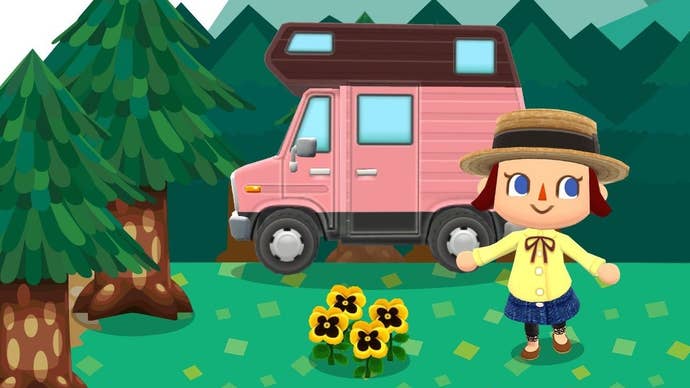
The microtransaction trend with these particular big-budget titles (in addition to Forza Motorsport 7 and many others) is that games are now monetizing power, just as free-to-play games do. Only with these big-budget titles, there's already a paid entrance fee. Games are neglecting to frame experiences that are fun for all levels of play—both the players that empty their wallets into it or only pay the entrance fee. Now, it's substituting tedium to incentivize spending because of annoyance, rather than incentivizing fun.
Virtual Foil Packs Forever
But there's another uncomfortable truth to be found in this mess: Microtransactions still make money. A lot of it. Nearly half of Take-Two's profits this past fiscal quarter were from microtransactions in the likes of Grand Theft Auto Online and beyond. Blizzard has amassed over a billion dollars with Overwatch alone, but won't disclose concrete figures. We're in an era where a Call of Duty set in World War II has loot boxes drop from the sky, as you run around acting out silly emotes with other players on the war-torn beaches of Normandy.
Overwatch can be attributed to at least partially popularizing the loot box trend in 2016, even though they had existed long before the game hit consoles and PC. Overwatch, much like MOBAs, is a game that monetizes aesthetic, and aesthetic alone. Players can't buy perks to make them better at the game; only fashion to make them look a little bit cooler when they're blasting away on that payload. Overwatch game director Jeff Kaplan even told Kotaku at BlizzCon this year that their game is one of the better examples, in his opinion. "I think on the big spectrum of loot boxes, between 'really good' and 'really evil,' I'd like to think we're more on that 'really good' side with what we're trying to do," Kaplan told the site.
What Stein currently sees in the gaming sphere in 2017 is something startlingly like deja vu: companies once again testing the boundaries for what they can charge players for, like the era of free-to-play mobile games years ago, before they learned their lesson of maintaining player retention.Path of Exile, the free-to-play online-action RPG from independent developers Grinding Gear Games, have made it a point to try and be "ethical" in how they implement microtransactions over the years. The model's proven its worth: the company has scaled from just three people to over a hundred over the years, a large feat for an independent team. With a new expansion on the horizon, the game continues to grow steadily. When we spoke to the developers behind the game ahead of the new expansion's release, they attributed their success to something specific.
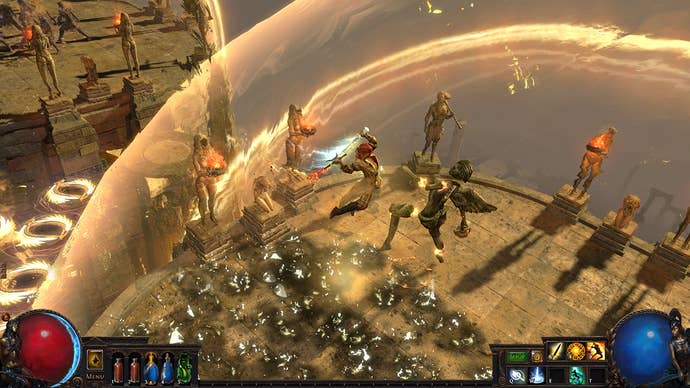
"I personally think a lot of the reason [we're successful] is that since people feel like we're treating them with respect, they then respect us enough to give us money," said Jonathan Rogers, Technical Director for Grinding Gear Games. "Like, most of the time, when people talk about spending money on Path of Exile, they're talking about supporting the company. I don't think you see that attitude in a lot of free-to-play games."
Counting the outrage of Star Wars: Battlefront 2 and Middle-earth: Shadow of War's loot boxes, respect seems to be a key issue. The average player doesn't feel like their time, or their investment in the game monetarily, is being respected anymore.
So yes, to reiterate what Jeremy Stein says: it's awkward right now. Developers are trying new ways to make money after season pass sales have slightly dipped for multiplayer games as players expect free content (like what Overwatch offers), looking for new ways to keep people playing their games forever. When a portion of people who buy games only buy one or two games per year, triple-A developers are scrambling to be that one game. If you squint, it's like there's a virtual-IV for cash to slowly drip into games.
Some are seeking to ban loot boxes in the wake of all the controversy. Or at least to regulate them, as China has with showing loot box probabilities for players. On November 21st, the Belgium Gaming Commission of Belgium reached a conclusion that loot boxes were indeed, at least from where they see it, a form of "gambling." They are now seeking to ban them in both Belgium and all of Europe. Meanwhile, the state of Hawaii announced that they are also investigating "predatory" loot boxes, and will pursue legislation to ban them. Given the weight of these two decisions, the future of loot boxes, perhaps more so in the United States, has been thrown into question.
There are smaller developers, of course, working against the trend too. Clicker Heroes 2 announced this week that they're dropping their free-to-play model for the anticipated sequel, opting for a paid entry instead over "ethical" concerns. Last month, Phoenix Labs announced that their game Dauntless is dropping loot boxes altogether. They're now moving towards a monetization model closer to Path of Exile and others like it, where players can "choose the things [they're] purchasing," as they told PCGamesN.
Meanwhile, even some bigger developers, like the team at Capcom behind Monster Hunter: World, spoke up against the idea of loot boxes making their way to a Monster Hunter title. "You've already kind of got loot as a core gameplay aspect without having to shove a microtransaction version of it in," Monster Hunter series producer Ryozo Tsujimoto told GameSpot earlier this month. "We want people to have the experience that we've made for them rather than the option to skip the experience."
Even with those working against the model, after seeing the NPD sales numbers for October showing low sales for single-player experiences without microtransactions like The Evil Within 2 and Wolfenstein 2: The New Colossus, it doesn't seem like 2018 will be much better. The fact of the matter is that people spend money on microtransactions, whether they love 'em or hate 'em, and publishers are in that growing pains phase like free-to-play mobile was long ago. Just weathering the storm, figuring out what precisely they can get away with.
So long live the loot box, or at least some form of it I guess. The virtual foil card pack of our time.
Reporting concerning Path of Exile and Star Wars: Battlefront 2 was contributed by Kat Bailey.





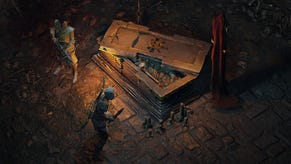
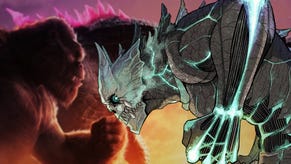
_ddwYK80.png?width=291&height=164&fit=crop&quality=80&format=jpg&auto=webp)

